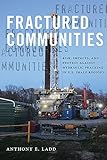Fractured communities : risk, impacts, and protest against hydraulic fracking in U.S. shale regions / edited by Anthony E. Ladd.
Material type: TextSeries: Nature, society, and culturePublisher: New Brunswick, New Jersey : Rutgers University Press, [2018]Description: 1 online resource (xiii, 303 pages) : illustrations, mapsContent type:
TextSeries: Nature, society, and culturePublisher: New Brunswick, New Jersey : Rutgers University Press, [2018]Description: 1 online resource (xiii, 303 pages) : illustrations, mapsContent type: - text
- computer
- online resource
- 9780813587691
- 0813587697
- Hydraulic fracturing -- Social aspects -- United States
- Hydraulic fracturing -- Risk assessment -- United States
- Petroleum industry and trade -- United States
- Shale gas industry -- United States
- Fracturation hydraulique -- Aspect social -- États-Unis
- Fracturation hydraulique -- Évaluation du risque -- États-Unis
- Gaz de schiste -- Industrie -- États-Unis
- SCIENCE -- Environmental Science
- NATURE -- Environmental Conservation & Protection
- POLITICAL SCIENCE -- Public Policy -- Environmental Policy
- SOCIAL SCIENCE -- Regional Studies
- SOCIAL SCIENCE -- Sociology -- Rural
- BUSINESS & ECONOMICS -- Industries -- General
- Petroleum industry and trade
- Shale gas industry
- United States
- Risiko
- Erdgasgewinnung
- Erdölgewinnung
- Fracking
- 338.2/7280973 23
- HD9565 .F723 2018eb
- SCI026000 | NAT011000 | POL044000 | SOC053000 | SOC026020
| Item type | Home library | Collection | Call number | Materials specified | Status | Date due | Barcode | |
|---|---|---|---|---|---|---|---|---|
 Electronic-Books
Electronic-Books
|
OPJGU Sonepat- Campus | E-Books EBSCO | Available |
Print version record.
Includes bibliographical references and index.
"While environmental disputes and conflicts over fossil fuel extraction have grown in recent years, few issues have been as contentious in the twenty-first century as those surrounding the impacts of unconventional natural gas and oil development using hydraulic drilling and fracturing techniques--more commonly known as "fracking"--Local communities. In Fractured Communities, Anthony E. Ladd and other leading environmental sociologists present a set of crucial case studies analyzing the differential risk perceptions, socio-environmental impacts, and mobilization of citizen protest (or quiescence) surrounding unconventional energy development and hydraulic fracking in a number of key U.S. shale regions. Fractured Communities reveals how this contested terrain is expanding, pushing the issue of fracking into the mainstream of the American political arena"-- Provided by publisher.
"In Fractured Communities, sociologist Anthony Ladd and a roster of leading young (and some old) environmental sociologists present a set of crucial sociological case studies analyzing the differential risk perceptions, socio-environmental impacts, and mobilization of citizen protest (or quiescence) surrounding unconventional energy development and hydraulic fracking in a number of key U.S. shale regions (or source rock formations) across the country. Ladd and his contributors find that the rapid development of shale gas and oil reserves through high volume hydraulic fracturing (HVHF) methods has spawned a growing anti-fracking movement that has been gaining political clout and scientific credibility nationwide, especially since Josh Fox's academy award-nominated documentary Gasland was released in 2010. In shale communities across the country (e.g. the Marcellus, Barnett, Tuscaloosa, Utica, Monterey, Woodford, Eagle Ford, etc.), citizens have mobilized to express concerns or protest what they perceive as a wide range of negative socio-environmental impacts associated with unconventional energy development and fracking--particularly its threats to water, air, land, climate, public health, animals, and sustainable economic development. To date, over 475 community bans against fracking have been passed in 24 states, including cities like Pittsburgh, and statewide moratoriums are in effect in New York and Vermont. Additionally, national moratoriums exist in France, Ireland, Scotland, and Bulgaria, Pope Francis has publically declared his opposition to fracking, and debates over shale drilling are growing across the European Union, South Africa, South America, and Australia"-- Provided by publisher.
Online resource; title from digital title page (viewed on March 15, 2018).
Intro; Series Page; Title Page; Copyright; Dedication; Contents; Preface; Introduction. Energy Matters; Chapter 1. Natural Gas Fracking on Public Lands: The Trickle-down Impacts of Neoliberalism in Ohioâ#x80;#x99;s Utica Shale Region; Chapter 2. This (Gas) Land Is Your (Truth) Land?: Documentary Films and Cultural Fracturing in Prominent Shale Communities; Chapter 3. Disturbing the Dead: Community Concerns over Fracking below a Cemetery in the Utica Shale Region; Chapter 4. Mobilizing against Fracking: Marcellus Shale Protest in Pittsburgh
Chapter 5. Engines, Sentinels, and Objects: Assessing the Impacts of Unconventional Energy Development on Animals in the Marcellus Shale RegionChapter 6. Motivational Frame Disputes Surrounding Natural Gas Fracking in the Haynesville Shale; Chapter 7. Denial, Disinformation, and Delay: Recreancy and Induced Seismicity in Oklahomaâ#x80;#x99;s Shale Plays; Chapter 8. Contested Colorado: Shifting Regulations and Public Responses to Unconventional Oil Production; Chapter 9. Citizen Resistance to Oil Production and Acid Fracking in the Sunshine State
Chapter 10. Public Participation and Protest in the Siting of Liquefied Natural Gas Terminals in OregonConclusion. Standing at the Energy Policy Crossroads; Acknowledgments; Notes on Contributors; Index
In English.
eBooks on EBSCOhost EBSCO eBook Subscription Academic Collection - Worldwide
There are no comments on this title.

